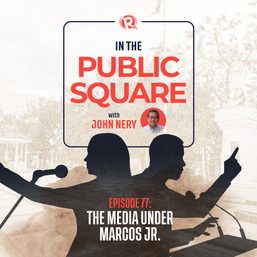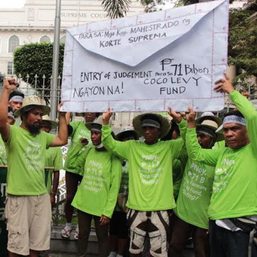SUMMARY
This is AI generated summarization, which may have errors. For context, always refer to the full article.

I was just in Grade 2 when the dictator Ferdinand Marcos declared Martial Law in 1972. But it had such an impact on the nation’s psyche that it influenced the course that I would take in college, the friends I made, the kind of journalism that I practiced, the causes I fought, and the non-negotiable values I held dear.
Most Philippine newsrooms today are led by journalists my age who did not directly experience Martial Law but benefited from the 1986 EDSA people power revolution that ended Marcos’ kleptocratic regime and opened the news media to idealistic aspiring journalists. The Philippine Daily Inquirer, which I joined as a fresh grad, was born two months before Marcos’ downfall, and some of its founders would later establish a separate newspaper, the Philippine Star. ABS-CBN, shut down by Marcos, reopened after 1986, and its newsroom has been run since then by our generation. (Former president Rodrigo Duterte shut it down again in 2020.)
To this day, Inquirer and Star have not forgotten, with the Star allotting a special section aptly titled “31 years of amnesia,” that not only reminds Filipinos of Marcos’ martial rule but debunks lies and myths about it.

Hello, Rappler + community! I’m Glenda M. Gloria, the executive editor of Rappler writing to you on the week that we commemorate Martial Law’s declaration half a century ago, and a day after President Ferdinand Marcos Jr. spoke at the United Nations General Assembly in New York. The ironies of this presidential visit at this time – and oh those ill feelings attached to them – can fill an entire page, which I am parking in the meantime.
Rage journalism
Instead, I share a bugging thought: will newsrooms continue to remember Martial Law 10, 20 or 50 years from now? Would the kind of journalism inspired by the democracy movement that fought Martial Law continue to shape reporters and editors in the coming decades – the kind that scrutinized presidential power, held public officials to the highest standards, followed the money trail, exposed corruption and abuse, and stayed with a story for months, even years?
Or would the lure and necessity of technology make them probably not forget, but in today’s euphemism, move on? Or would it induce them to tell Martial Law’s horror in pulverized, snackable episodes that will commemorate certain things but not weave them into a coherent whole of established truths, the basis of collective memory?
The majority of Rappler’s editorial team came of age – as students or professionals – in the post-Marcos but pre-Duterte years, when liberal democracy held promise as a counter to authoritarian rule. This meant a shared belief system in the value of press freedom, human rights, check and balance among the executive, judiciary and the legislative, and civilian supremacy over the armed forces. This meant a low boiling of rage over public officials’ wrongdoing and abuse.
But Duterte’s presidency and Marcos Jr.’s successful election campaign sidelined – and even mocked – all this, even as the illiberal march in other countries continues.
Unfinished work
It’s probably too much to shift the burden of remembrance to future journalists when the current crop still has to come to terms with unfinished business.
As we wrote in our editorial on Monday, we committed the gravest sin of omission, and failed to fill the void that today’s smartly crafted false memories managed to fill among those who neither suffered from Martial Law nor lived it.
Is it too late?
I believe we still have enough time to write, to teach, and to practice what motivated us to become journalists in the first place: to temper power and hold it to account, to speak for the powerless, and to show that power can be wielded for the greater good.
The story of Martial Law – corruption, violence, patronage, propaganda – persists to this day in various shapes and hues, a thousand cuts to our democracy in this unfortunate land of perennial democratic transitions. It’s a never-ending story, and there is no more lamentable proof of this than the Duterte years, which pumped new life to the vestiges of those dark years 50 years ago.
At Rappler, we want to guard against not just forgetting, but against what Martial Law represents – thus our unrelenting coverage of human rights, the rule of law, press freedom, corruption. On these issues, there are books waiting to be written, films waiting to be made, stories waiting to be told in long, untruncated forms, songs to be sung, art to be crafted, and lessons to be taught and shared.
“Do not go gentle into that good night,” wrote the poet Dylan Thomas.
“Rage, rage against the dying of the light.” – Rappler.com
Add a comment
How does this make you feel?





![[Closer Look] ‘Join Marcos, avert Duterte’ and the danger of expediency](https://www.rappler.com/tachyon/2024/06/TL-trillanes-duterte-expediency-june-29-2024.jpg?resize=257%2C257&crop_strategy=attention)




There are no comments yet. Add your comment to start the conversation.